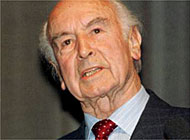
Colourful moments with the man who invented LSD

Albert Hofmann, the inventor of the psychedelic drug LSD, is one of the few Swiss who can lay claim to having changed the world. Markus Haefliger went to meet him on his 95th birthday.
The view from Albert Hofmann’s study – of the rolling hills of Alsace – has hardly changed in 100 years. His house, built in modern style in concrete and glass, is tucked away in the last corner of the last village in the Birsig valley near Basel.
Hofmann, although sprightly for his advanced age, is less enamoured with the modern world than one might have expected from the man who invented lysergic acid diethylamide (LSD) – a drug that that defined the hippie age.
“The material aspect of reality is not everything,” he says. “Its spiritual aspect is equally important. But in our rational world people have lost contact with that kind of reality.”
Hofmann is convinced that the substance which made him famous, LSD, is just the thing to bridge the growing gulf between the material and spiritual worlds. “As much as we need medicines to regulate our various physiological systems, we need them to stimulate our religious feelings, too.”
The Swiss scientist could easily have become a drugs guru like the psychologist Timothy Leary, who preached in the 1960s and 70s that world peace was possible if only everyone was high on drugs. When Leary had to flee his native US in 1971, he sought asylum in Switzerland – not least because of Alfred Hofmann.
Hofmann also received dedications from some of the century’s leading artists – among them “pop art” painters Jasper Johns and Andy Warhol, and the writers Tom Wolfe and Aldous Huxley – who said their work was influenced by LSD.
Hofmann, who spent most of his career working for the Basel-based pharmaceutical company, Sandoz (which later merged with Ciba-Geigy to become Novartis), is proud of the tributes, but too much of a scientist to be carried away by them.
He has condemned the mass use of LSD – which turned political opinion against the drug, leading to its prohibition – but remains convinced of the drug’s therapeutic properties for the mind.
Until his last LSD trip over 30 years ago, Hofmann always took the drug in what he calls “controlled” circumstances – with friends and after a meditative session. But there was once exception – the first time.
It was during the Second World War, and Hofmann, who was researching circulatory stimulants, remembered a substance that had been cast away as ineffective five years earlier.
It was a derivate of a substance found in ergot, a fungus that grows on rye and other cereals. By 1943, Sandoz had developed more sensitive testing methods, so Hofmann wanted to have another go.
“By chance, I got a whiff, and immediately felt exhilarated,” he recalls.
Having become curious, Hofmann decided to use himself as a guinea pig. One fine spring day, he took 0.25 milligrams of LSD – three times the amount needed for a fully-fledged high. “It was a horror trip”, he remembers.
Hofmann considers LSD a “sacred” drug. After the war, he researched “magic” substances found in traditional cultures around the world. In Mexico, he discovered that the mushrooms used by the Mazatec Indians during their religious rites contained natural LSD.
Hofmann also believes the ancient Greeks laced one of their sacred drinks with LSD before it was passed around during an annual fertility ritual. “We found an indigenous fungus growing nearby that contains a quasi-identical substance,” he says.
He is unsure whether he was a philosopher before his first LSD trip, or whether he became one because of it. “I was a philosopher in the sense that every child is one – I was immensely curious and became a natural scientist as a result.”
But he also says that LSD transformed his life.
Hofmann is critical of the total ban on LSD, which was once a respected pharmaceutical drug. It proved successful in the treatment of people with psychological disorders, and he says that: “For this purpose at least, and for further research, LSD should be legalised.”
He has said he sometimes resents being known only for having invented LSD, and would like credit for having developed three other drugs, which are still on the market. But Hofmann often returns to the subject of LSD himself.
He is reluctant to talk about worldly matters beyond the issue of legalising LSD, which he described as “my problem child” in his book of the same title (which has been translated into eight languages).
Asked if the research environment in the pharmaceutical industry had changed since the 1940s, the only difference that he mentions is the improved effectiveness of animal testing.
Nowadays he spends his time walking in the woods and tending his garden. His mystical experiences these days come from being close to nature – “You don’t need LSD for that,” he explains. “It just helps you get access to it.”
His other pleasure is spending time with his four great-grandchildren. “They love it here so much”, he says. “The running around in the fields, and swimming and splashing in our pool.”
by Markus Haefliger

In compliance with the JTI standards
More: SWI swissinfo.ch certified by the Journalism Trust Initiative





























You can find an overview of ongoing debates with our journalists here . Please join us!
If you want to start a conversation about a topic raised in this article or want to report factual errors, email us at english@swissinfo.ch.